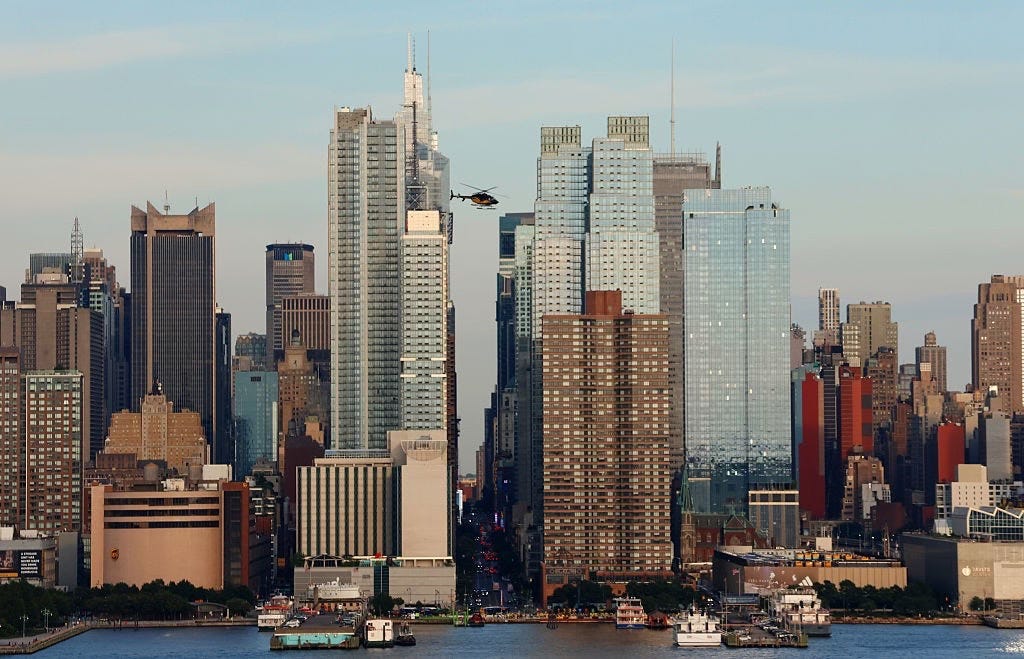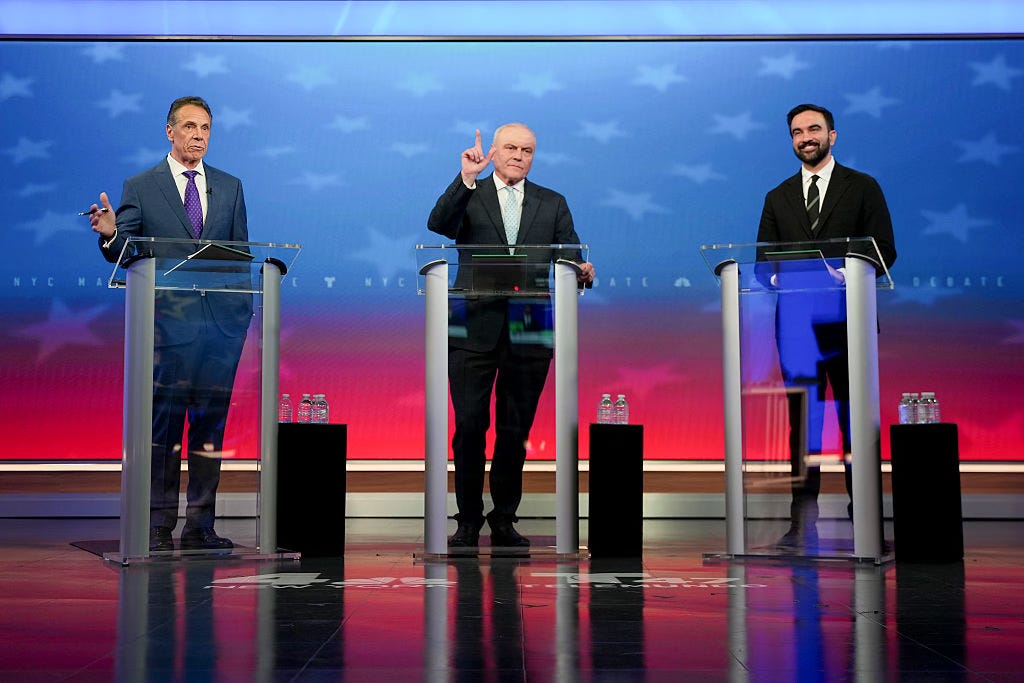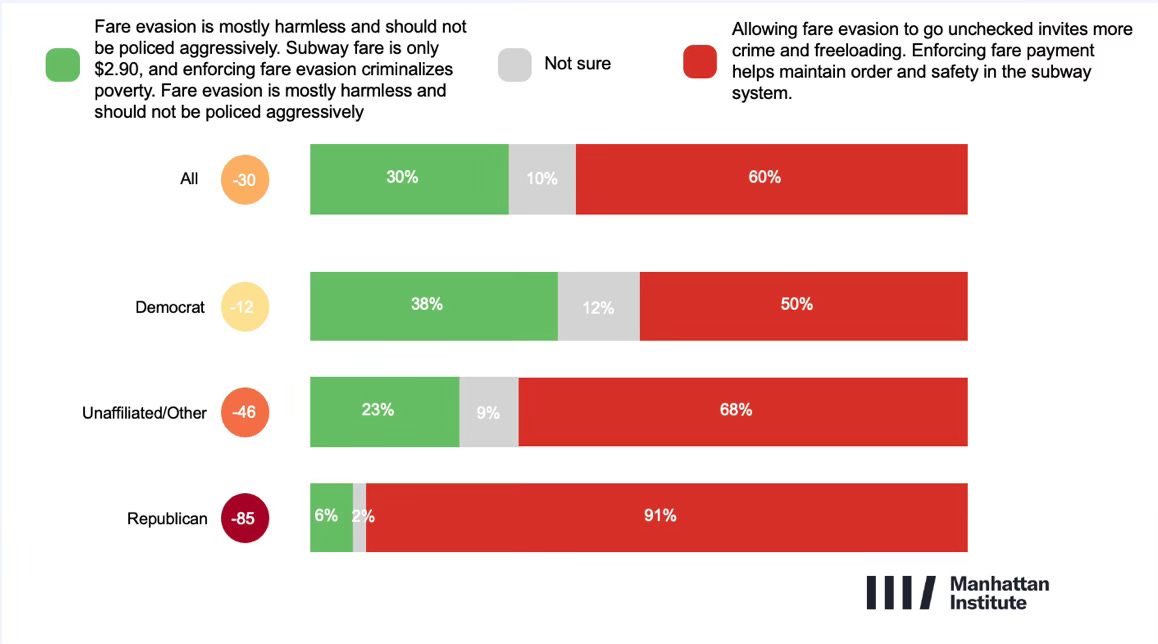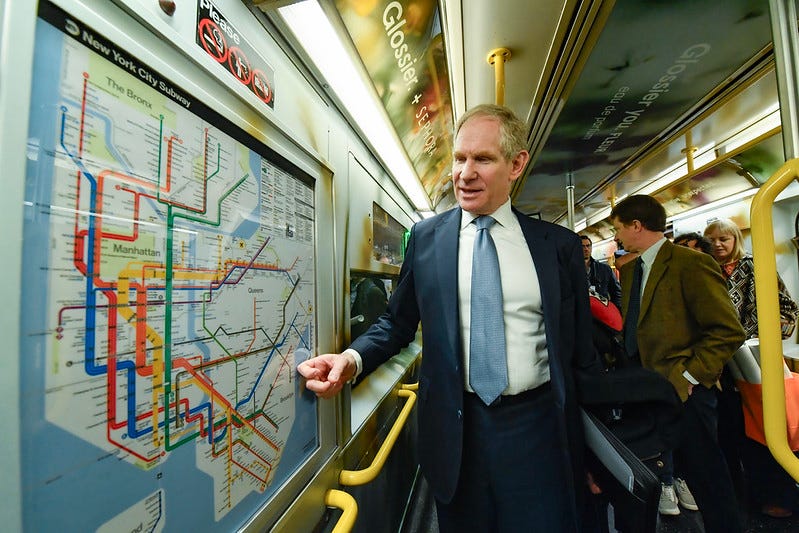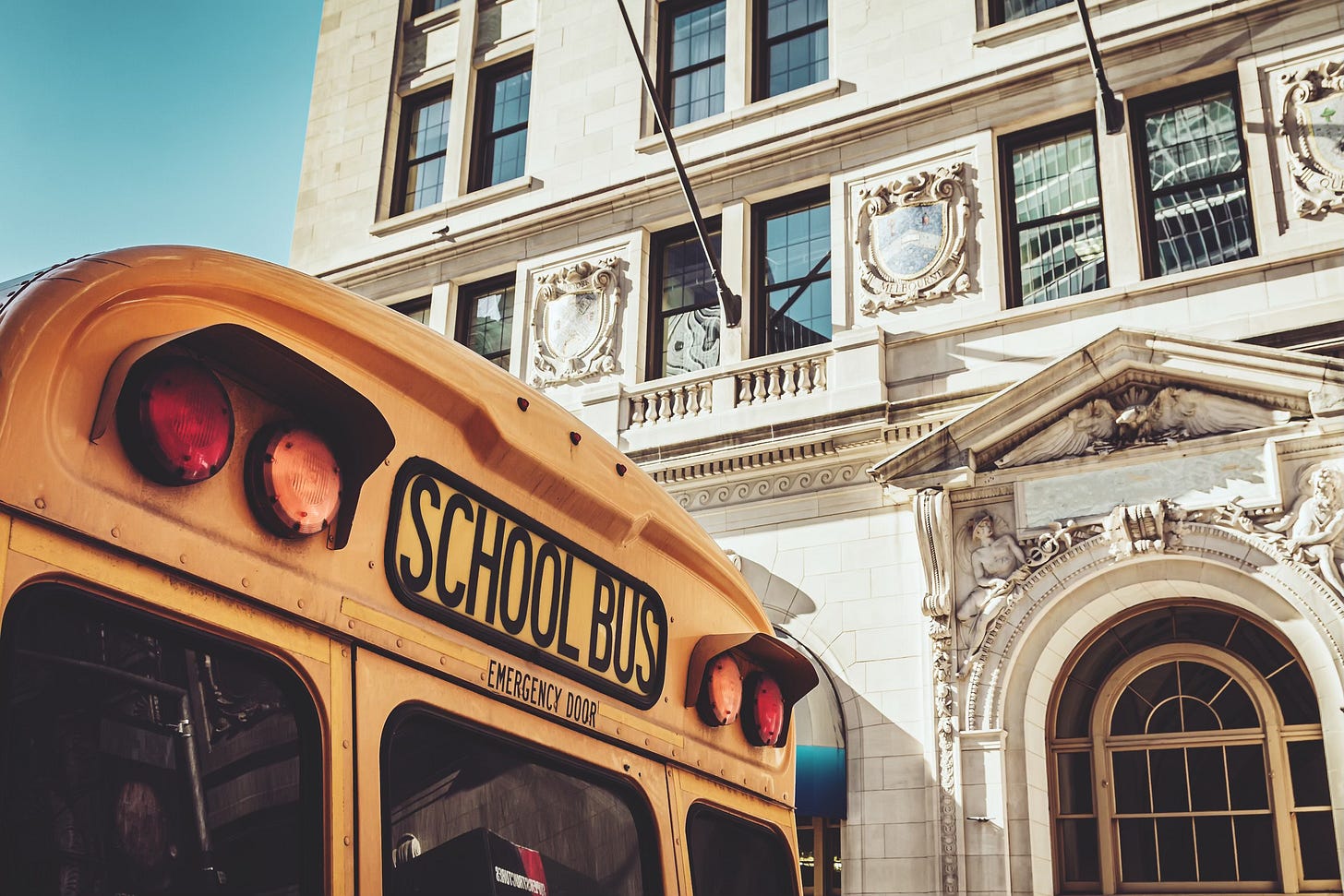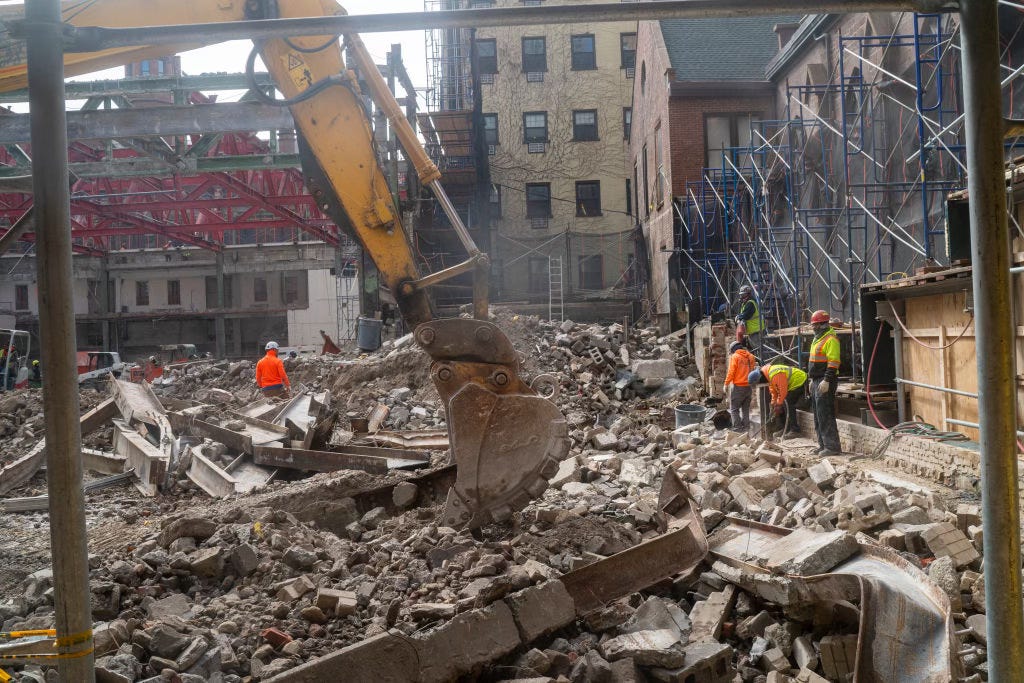Marathon Week in New York: Race to the Finish
Mamdani leads, Cuomo fights on, and the MTA chief weighs in on free buses.
This Sunday, tens of thousands of runners will pound the streets of New York for the Marathon — and two days later, voters will do their own endurance test at the polls. The city’s greatest sport has always been politics, and on Tuesday, the race to City Hall reaches its finish line.
This week’s Bigger Apple digs into the home stretch of the mayoral race — from our new poll showing Mamdani ahead despite widespread opposition to his policy agenda, to Janno Lieber’s sharp take on free buses, and whether New York City could ever go broke again.
Mayoral Campaign Update
With early voting underway and a record number of voters turning out across the age spectrum, polling shows that Zohran Mamdani is still our likely next mayor. But if this unusual combination of voters shows up for him, Cuomo’s got a chance.
Fox News, Marist, Quinnipiac, Emerson, and our own polling between October 22-28 show Mamdani with 43-51%, Cuomo with 26-33%, and Sliwa with 14-21% of the vote. As always, keep in mind sample sizes and error margins.
If Mamdani were to win the race, he would want to win with more than 50% of the vote to claim a broad mandate. No modern mayor since John Lindsay has won with fewer than 50%. Here’s how he could do it, writes left-leaning analyst Michael Lange.
Early voting ends on Sunday. Election Day is Tuesday, November 4.
More Politics
Our colleague was ejected from Mamdani’s weekend rally. “The incident, combined with the Mamdani campaign’s refusal to engage with my prior outreach, raises questions about the candidate’s commitment to transparency. Will a Mayor Mamdani deny access to reporters who disagree with him?” asks MI’s investigative reporter Adam Lehodey.
Cuomo received a late re-endorsement from former mayor Michael Bloomberg, who also endorsed him in the primary, while Mamdani received backing from bodega owners.
Zohran Mamdani’s meteoric candidacy is deeply polarizing New York, POLITICO reports.
Sliwa feels right at home among Polish New Yorkers in Greenpoint and Ridgewood, The City reports.
What to know about the NYPD commissioner Mamdani, Cuomo, and Sliwa all say they’d keep by Gothamist.
There have been a lot of over-the-top attacks on Mamdani about his religion and ideology. He is not going to nationalize Gristedes and impose Sharia law. A more measured and thoughtful critique comes from Zineb Riboua,who sees “third-worldism” in Mamdani’s language and outlook.
Santi Ruiz of Statecraft talked to former first deputy mayor Maria Torres Springer about what it takes to run the city.
MI’s Poll Shows Mamdani Ahead, Despite Unpopular Agenda
The poll highlights a gap between Mamdani’s political appeal and public support for his progressive agenda. Most New Yorkers back tougher penalties for fare evasion, want to roll back the state’s 2019 bail reform law, are skeptical of free bus service, and favor merit-based standards in public education.
Janno Lieber on Free Buses, the State of the MTA, & The Promise of the Interborough Express
Janno Lieber, Chair and CEO of the MTA, which runs the city’s subways and buses as well as LIRR and Metro North, had a lot of thoughts on the idea of free buses and skipping fares in a conversation with the New York Editorial Board, of which my colleague Nicole Gelinas and I are members.
Transit is one of the few things that keeps New York affordable—residents spend far less on transportation than most Americans and programs like Fair Fares help by giving low-income riders subway and bus discounts. But if the city makes buses free while charging for the subway, it could shift riders, reduce subway use, and unfairly disadvantage working-class commuters who rely on both modes.
There’s been experiments around the world. Others have, I have not studied, but other systems have experimented with universal free transit, and there have been some downside consequences which would need to be studied, because all this stuff deserves to be taken seriously.
We are like an incredibly business-like organization, and we’re not doing things– We’re not treating New York like it’s Dr. Frankenstein’s laboratory: Let’s just attach the electrodes and see what happens. That’s not the way to run something that’s this important and this central to New York.
He also talked about unions, subway cleanliness, mental health and safety, and other transportation issues you may find interesting.
Image via MTA
The Case for Mayoral Control in New York City Education
New York City’s experience shows that how schools are governed matters. Under mayoral control, the city has achieved higher graduation rates, narrowed achievement gaps, and greater system-wide efficiency than board-led districts. Returning to elected boards with frequent turnover would risk undoing two decades of progress, MI’s Jennifer Weber finds in a new report.
With 900,000 students, NYC’s schools depend on stable leadership to sustain reforms and improve learning. The core question is whether governance can maintain that stability—mayoral control remains the clearest path forward.
What If Building More Homes Isn’t the Answer?
In this conversation published by the Boyd Institute, economist Cameron Murray examines housing markets from an alternative angle, arguing that the so-called “housing crisis” is less a failure of regulation and more a structural feature of economic growth, interest-rate cycles, and wealth dynamics.
He challenges mainstream narratives—like the idea that more supply automatically lowers prices or that “spatial misallocation” is the primary culprit—by pointing to historic patterns, the influence of low mortgage rates, and how rising affluence drives housing upgrades rather than simply more dwellings.
Agree or disagree, it’s an interesting listen/read.
Extra! Extra!
It’s impossible to move forward on New York’s Penn Station overhaul without next-generation Hudson River tunnels, which Trump is threatening to pull funding from. (The American Prospect)
I wrote about what is considered “essential” work in NYC, how that label seems to be morphing to include clearly non-essential jobs like food delivery.
The Waterfront Roadmap for the next Mayor of New York City, by the Waterfront Alliance, urges more investment to support and protect the maritime economy. They also released the Flushing Meadows Corona Park Resilience Study.
Could New York City Ever Go Broke Again?
On October 30, 1975, the New York Daily News ran one of the most famous headlines in American journalism history, MI’s E.J. McMahon writes.
“Ford to City: Drop Dead” did a lot to shape—and distort—popular impressions of what transpired at a crucial juncture in a multi-year municipal fiscal crisis that has enduring relevance to New York City’s politics and governance.
For his takeaways, thoughts on the lessons the city has forgotten, and what that may mean for the future, here’s a City Journal piece from earlier this year:
Could New York City ever go broke again? The answer is no—or at least, not in the same way as it did in the 1970s, because of financial guardrails set up by the reforms of that era. The prosperity that lifted New York out of virtual bankruptcy, however, also seeded new versions of the political impulses that gave rise to the crisis in the first place. The elected officials who nowadays dominate city hall and Albany exude a sense of fiscal entitlement and economic invulnerability, an aversion to any suggestion of limits on government ambitions, strikingly reminiscent of the Wagner and Lindsay eras. The city’s sprawling network of tax-subsidized nonprofits—a political force that didn’t exist a half-century ago—lobbies relentlessly for higher spending while serving as an organizational network for progressive activists and politicians. Nearly one-quarter of New York’s private-sector employment—twice the share of 30 years ago—is now concentrated in the publicly subsidized health-care and social-assistance sector, which accounts for all the city’s post-pandemic job growth. The municipal labor unions are as powerful as ever, if not more so.
In short, New York City is poised for another epic fiscal fall. A moderately severe recession is all it would take to push it over the edge. This time, the climb back to fiscal stability could be considerably more difficult.
Podcast Recommendation: Curb Enthusiasm
For when you really want to get into the weeds on — say — the bridges of NYC, city’s department of transportation has you covered.
Top image by Gary Hershorn/Getty Images


